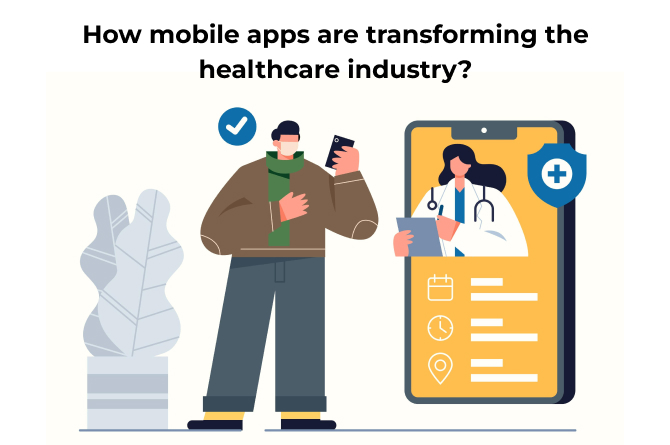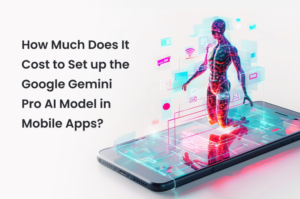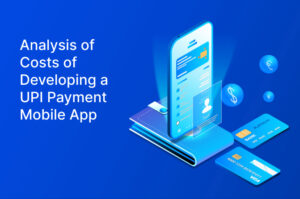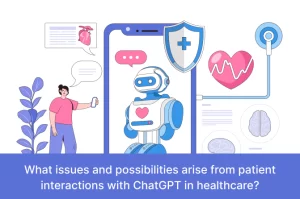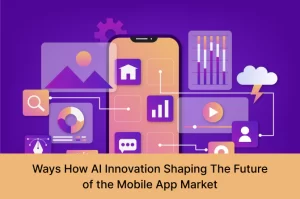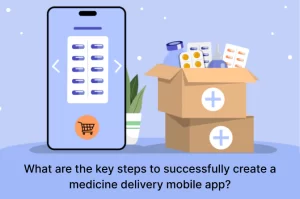Mobile applications are important in our lives because they provide users with a wealth of information and serve as a useful platform for business, banking, education, sports, and other activities. Mobile Apps have become a requirement for humans, allowing individuals all over the world to participate in numerous activities at any time. It uses modern features and functionality to change the industry and push it to new heights.
The healthcare industry has consistently been at the forefront of technical breakthroughs. In recent years, the incorporation of mobile apps has drastically altered how healthcare services are delivered and accessed. Mobile apps have been shown to be effective tools for connecting patients and healthcare experts.
There are various ways in which mobile apps are changing the healthcare industry. Statista, predicts that the mobile health business will generate more than 189 billion US dollars by 2025. With technological advancements increasing, doctors are utilizing mobile applications to assist with patient care. Indeed, nearly 80% of physicians already use mobile devices to expedite their daily medical procedures. Patients are simultaneously using health applications to improve their lifestyles. As a medical expert, you should understand how mobile apps are revolutionizing the healthcare business. This allows you to incorporate cutting-edge technological improvements into your practice. Continue reading to find out how mobile apps are altering the healthcare industry.
In this article, we’ll look at how mobile apps are transforming the healthcare industry, and how Mobile App Development Services and healthcare industry apps are playing a critical role in that shift.
Developing a Manual for Developing a Mobile Application Designed for Healthcare
Although the mobile app development process for hospital mobile applications shares some similarities with other software development processes, there are numerous significant distinctions due to the particular niche.
1. Capturing Requirements: During this early phase, healthcare mobile app developers must collaborate closely with stakeholders to collect and understand their specific needs, resulting in the identification of desirable features for the hospital app. Information, such as user roles, hospital workflows, and data requirements, is critical in determining the process’s next stages.
2. Designing : Slowly develop the mobile healthcare app by participating in the UX/UI process. Because visual appearance is the component that interacts directly with users, ensure that the app design is aesthetically pleasing and provides simple navigation. Wireframing, prototyping, and developing design mock-ups are all required actions at this level.
3. Development : To obtain input from early adopters, it is recommended that you construct an MVP containing the necessary functionality. Reviews are valuable tools for improving the product in future official releases. The development process typically consists of coding the front-end and back-end components, implementing the necessary functionalities, and integrating with external systems.
4. Testing & Release : Make sure your mobile app is deployed with strict security measures and testing methods such as unit testing and integration testing to avoid violations related to regulatory requirements, including HIPAA and DPA, as hospital apps often deeply interfere with patient data. Your healthcare mobile app is ready to launch in the target environment after fixing any bugs or issues.
It is important to note that hospital solutions are typically designed to a particular healthcare institution’s branding requirements and visual identity in order to provide hospital-specific services and features. Paying close attention to these specific needs throughout the hospital app development process will greatly assist the development team in creating and improving healthcare services.
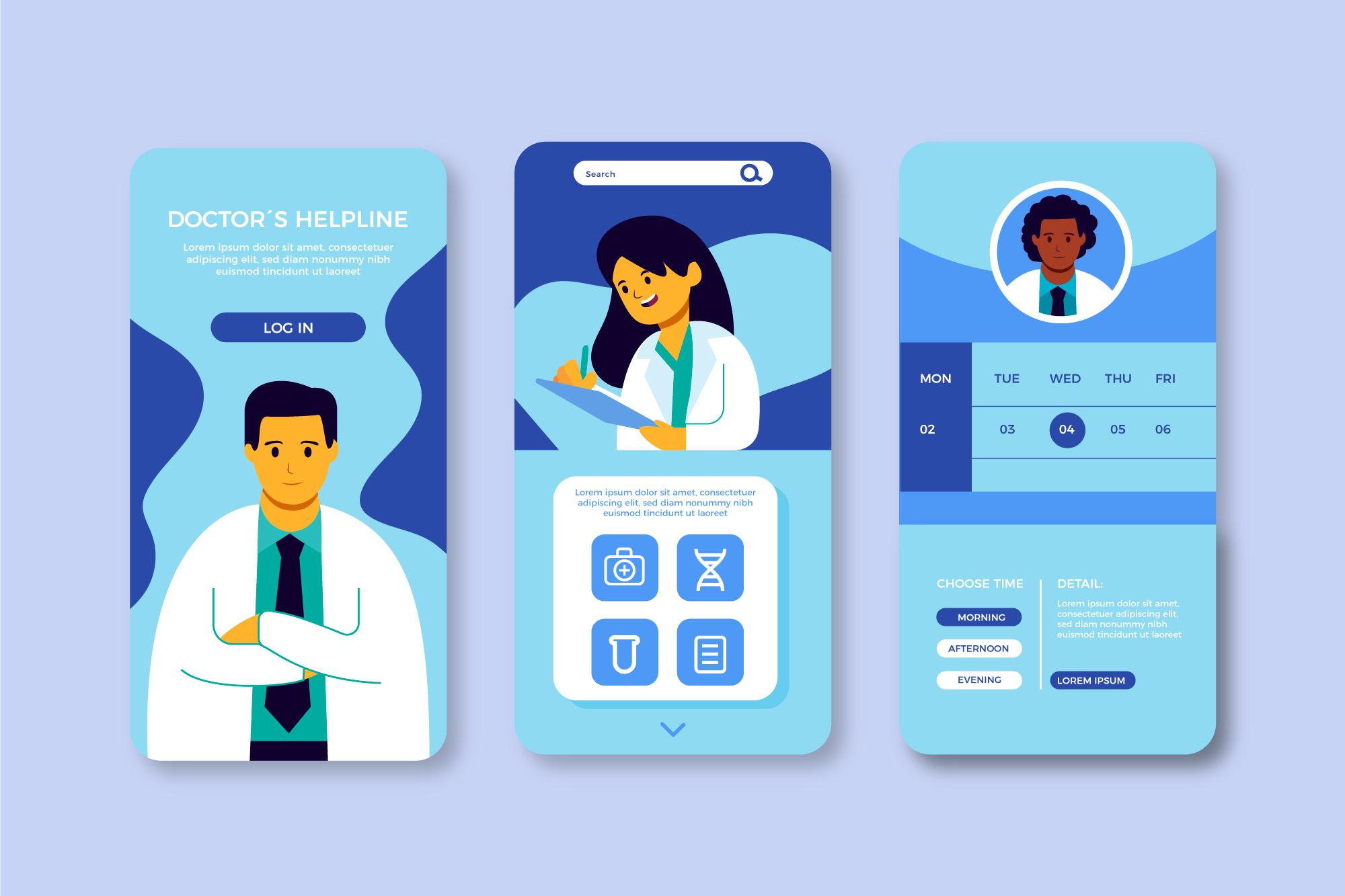
Which Platform to Use for Your Healthcare Mobile App?
The continuous evolution of different technologies has opened up new ways of application development.
Your healthcare mobile app or mHealth app should not be just limited to scheduling appointments. It should provide useful information to patients and solve their problems in real time. That’s why you need to make sure that you’re using the right platform and technology for your custom mobile app development.
Below are some popular technology trends that you need to consider for your healthcare mobile app:
1. Artificial Intelligence (AI)
Artificial Intelligence (AI) offers a number of benefits to the healthcare system. For doctors, AI technology helps make better data-driven decisions. AI can improve the efficiency of the diagnosis process and the overall treatment process.
2. The Internet of Things (IoT)
The IoT (Internet of Things) technology is used to connect different electronic devices, software, and applications to collect data and manage processes across the platforms.
With the help of IoT integration, doctors can collect valuable information about the patient’s current health status, medicine, and dosages and monitor the treatment progress.
3. Blockchain
You might already know about blockchain, thanks to the Bitcoin and cryptocurrency rage. Blockchain technology uses a peer-to-peer database to save verified records of all transactions. You can use this technology for your custom healthcare mobile app to record and save patients’ medical history in an encrypted form.
4. Augmented Reality (AR)
Augmented Reality or AR is a digitally formatted version of the real world. It takes images, videos, and other data from the real world, and expands it.
Mobile applications built with AR can help doctors and surgeons drastically improve the experience and efficiency of training and hands-on patient care. It can stimulate the real-world experience of a specific surgery or diagnosis to help doctors better understand its feasibility.
5. Big Data Analytics
Big Data provides adequate data, stats, and numbers, that can be processed through sophisticated software.
It can help hospital owners, healthcare providers, and doctors manage a large number of records and resources, eliminating the need for paperwork.
6. Voice Recognition
With the progress of the cloud and cognitive IT commands, voice recognition is becoming an increasingly important component of human-machine interaction. Voice recognition, along with significant developments in Artificial Intelligence and Deep Learning, enables unparalleled clarity by placing required content.
Voice recognition technology enables a user to construct a profile based on dictation in a matter of seconds. The system adapts to changes in the user’s voice, such as a cold, a change in microphone, or the environment. The cloud-based software solution and development then provide relevant recommendations while ensuring regulatory compliance, resulting in higher-quality treatment. By doing so, it is feasible to prevent looking back on medical data and limit the waste of time that would be included.
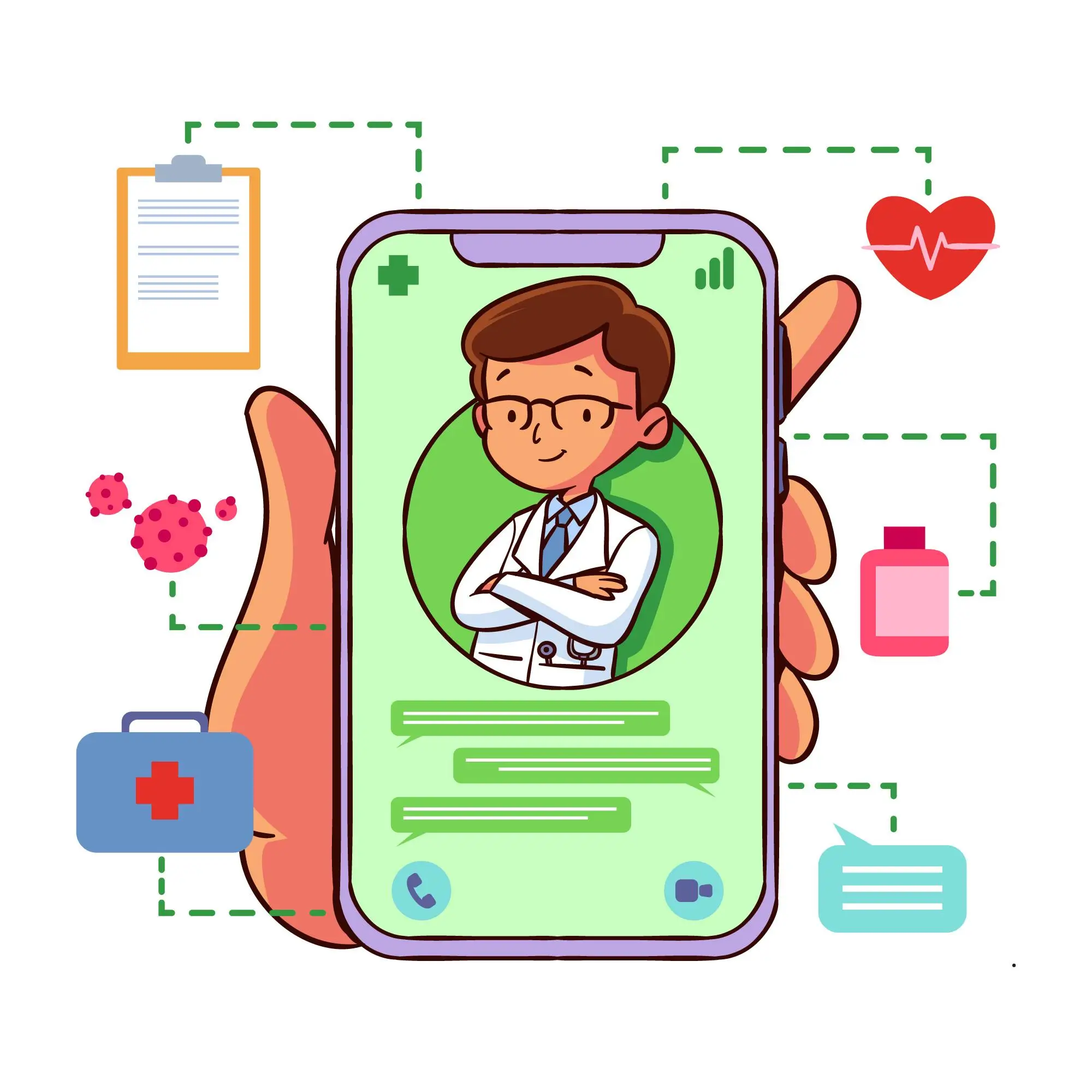
How Mobile Apps Can Benefit Healthcare Businesses?
Healthcare mobile apps can help patients in various ways, from improving communication with their doctors to increasing access to a wide range of healthcare services and more. Here’s how healthcare businesses can take advantage of custom healthcare mobile apps.
1. Facilitate Immediate Access
With the help of a custom mobile app, you can offer an online appointment option to the patients. This gives immediate access to your patients so they don’t have to leave their house and wait in long queues at your hospital.
All they need to do is install your healthcare mobile app and set up an account. They’ll be able to share their health concerns straight to you without any complications.
2. Efficient Handling of Emergency Cases
Hospitals and healthcare providers offer a dedicated app that can effectively manage emergencies. The mobile application will notify the doctors of the emergency, and all relevant information will be delivered to their smartphone.
This will save doctors time and allow them to plan for emergencies in advance. A customized mobile app can also help doctors and healthcare providers speed up the paperwork and treatment process.
3. Improved Coordination
A custom mobile app can help doctors and hospital staff easily coordinate with patients. It can also streamline the process between different departments, labs, and staff within the same premises.
Doctors can directly communicate with the patients and prescribe suitable medications. The mobile app will notify doctors and patients about the upcoming appointment, and notify hospital staff if any reports/documents are required for the diagnosis.
For nurses and other staff, the mobile app will provide updates on the patient’s ongoing treatment, and alert them if any medications are due.
4. Easy Integration with Wearables for Data Collection
The mobile app can even be integrated with wearables like pedometers to collect data such as pulse rate, blood pressure, etc.
The mobile app will collect daily updates about a patient’s health through wearables and save them in the database.
5. Excellent Business Opportunity
Unlike other industries, the healthcare industry has yet to fully embrace automation and emerging technologies.
With the introduction of powerful technologies like Artificial Intelligence (AI), Blockchain, and IoT in healthcare mobile apps, many future entrepreneurs are taking a dive into this field more than ever.
Healthcare mobile apps help doctors, healthcare service providers build a brand, improve customer experience, and increase profits in the long run.
Potential features to look for in a mobile healthcare app
These are some features that the health mobile app incorporates and is efficiently used by the users to record their healthcare data and access medical treatment. The goal of every healthcare mobile app is similar as it comes with a package of reliable services and advanced methods.
- E-prescriptions
This technology enables people to obtain online prescriptions without visiting hospitals. Both the patient and the doctor will benefit from the savings in time and money. A specialist can generate and transmit the prescription to the desired patient, along with all of the essential information.
- Virtual Monitoring
Mobile apps enable patients to schedule appointments and receive treatment on time. Doctors will monitor your health using your medical records and discuss the situation electronically via video conference or phone calls. This function is simple to use for all patients and adapts new techniques to get the desired outcome.
- Notification & Messaging
There is no need to wait any longer to schedule appointments. Online health mobile apps may send you reminders about forthcoming appointments or diagnoses. The notification feature allows you to receive your treatment on time and without difficulties. Online transactions are also available with these mobile apps. You can pay for your treatment online using a choice of payment methods available through the mobile app. This validates your status and makes sure you send a message.
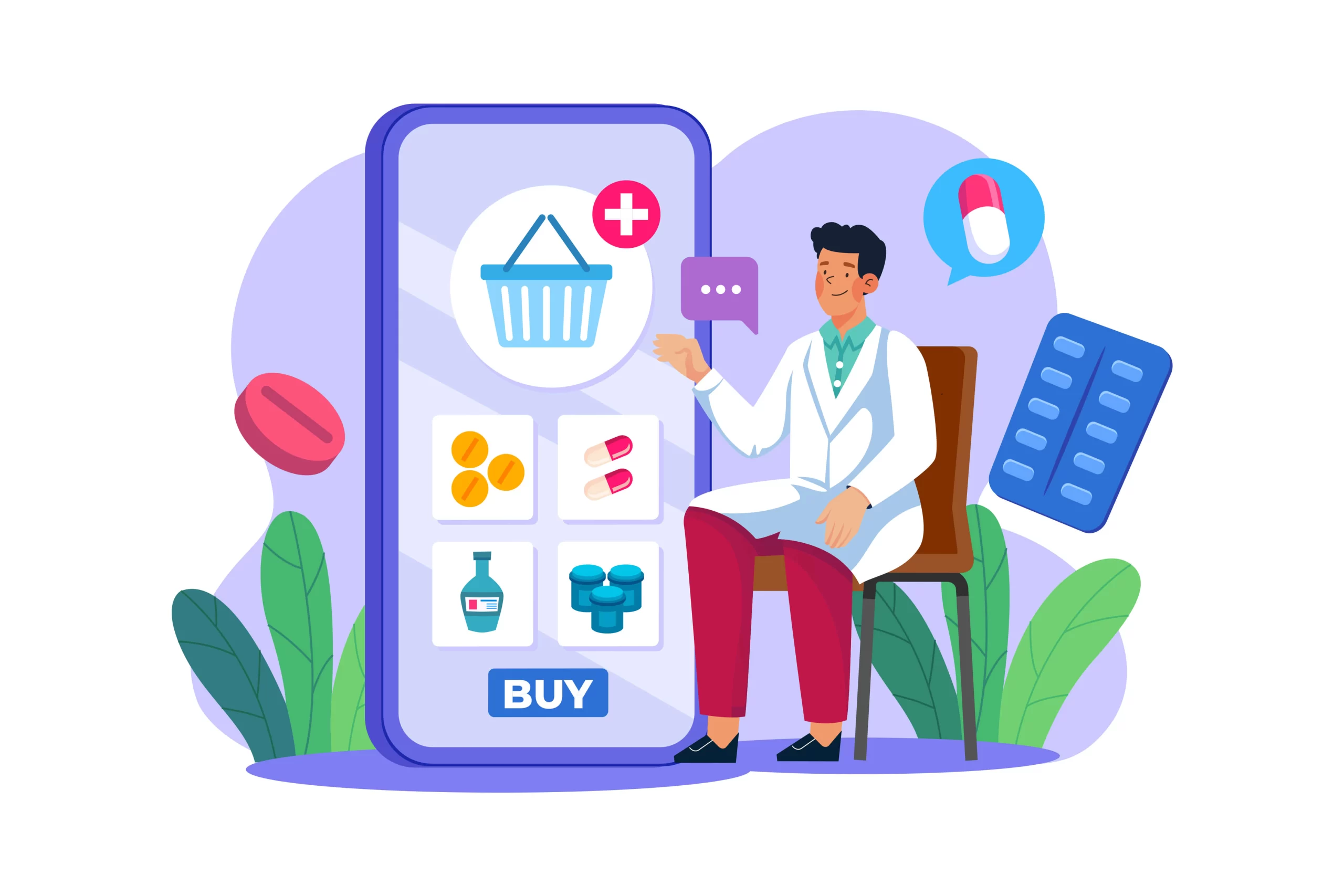
- Digital Prescription & Health Records
There is no need to visit a medical store to get prescriptions; the online professional will provide online treatment after analyzing your medical history. Determine the proper dosage based on your health status. It also reduces human error in dispensing wrong prescriptions and benefits patients who are unable to visit hospitals but can still receive treatment.
- User Dashboard
The user dashboard offers a great user experience. Depending on its purpose, the healthcare mobile app provides all of the information that patients and professionals need. It ensures that all relevant updates are shown on the dashboard, allowing you to learn more about health.
- Third-Party Integrations
Progressive healthcare mobile apps have a feature that lets users easily control and store their data. The medical industry employs APIs to store vital records. This will help you to synchronize data, improve the program’s overall structure, and take it to the next level.
Alphaclick is a popular mobile app development company in USA that provides smart healthcare services to people globally. We provide a variety of healthcare apps, including a fitness app, a women’s wellness app, and many more. Patients can book appointments online, make reservations, and view their medical records.
Last Words: How mobile apps are transforming the healthcare industry
To summarize, the integration of mobile apps into the healthcare industry is transforming how healthcare services are delivered, received, and managed. With the ongoing growth of the healthcare industry mobile apps and the competence of mobile app growth services, we may anticipate even more innovative advancements in the future. These smartphone apps have the potential to improve patient outcomes, lower healthcare expenditures, and increase overall healthcare quality. As we move forward, healthcare providers, developers, and regulatory authorities must collaborate to ensure that mobile healthcare solutions are safe, effective, and accessible to all, eventually benefiting both patients and healthcare professionals. The healthcare industry’s transition to a digital future is already underway, and the opportunities are endless.
If you are interested in generating a high-quality product, please contact us.

